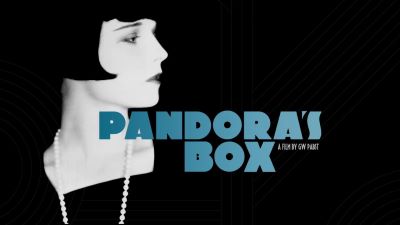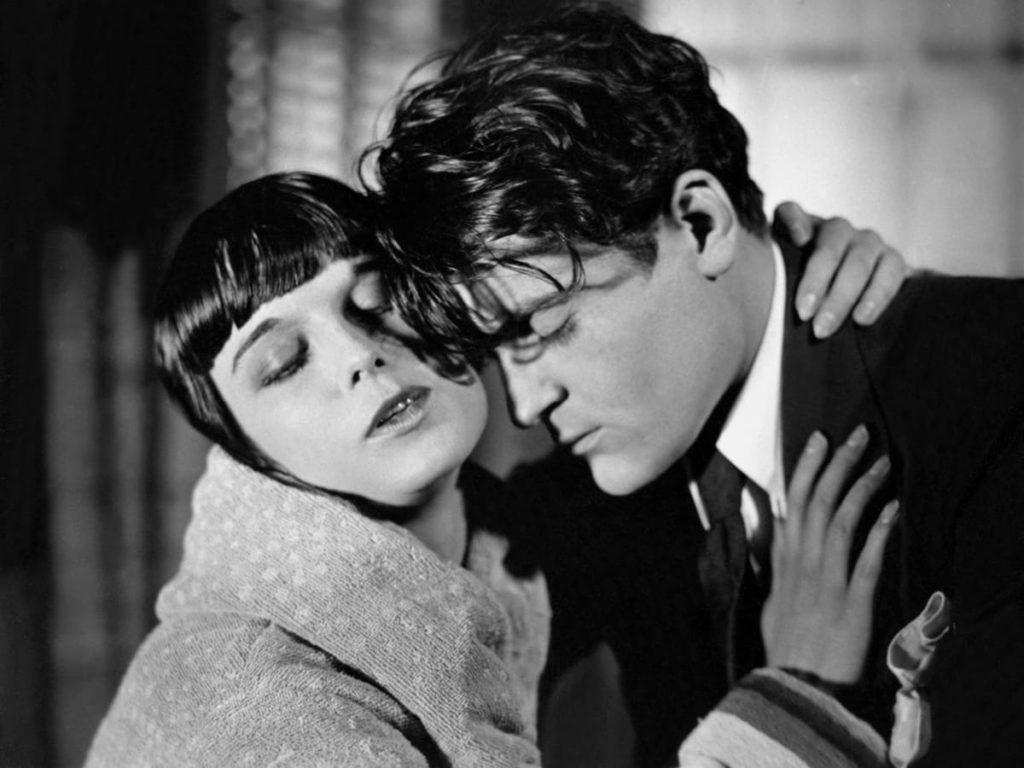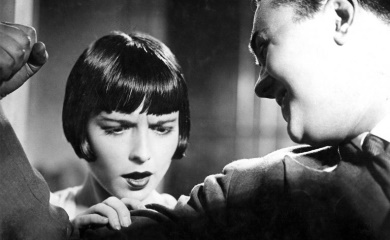OUTSIDE OF THE BOX
 Norma Desmond‘s iconic pronouncement “We had faces then” might well have been written specifically for Louise Brooks. This is a face that defies time and period, and is as relevant today as it was in 1929 when she was lured to Germany by G. W. Pabst to play the doomed Lulu in Pandora’s Box.
Norma Desmond‘s iconic pronouncement “We had faces then” might well have been written specifically for Louise Brooks. This is a face that defies time and period, and is as relevant today as it was in 1929 when she was lured to Germany by G. W. Pabst to play the doomed Lulu in Pandora’s Box.
Pabst was ready to give the role to Dietrich when Brooks became available. Indeed, Dietrich was sitting in his office ready to sign a contract when Brooks’s cable arrived to announce her availability. Pabst made a wise choice. Dietrich’s innate exoticism might have made Lulu an unsympathetic predator. Brooks’s open, seemingly guileless smile was the perfect mask for the underlying drives of Wedekind’s sexually compulsive Lulu. And yet, for all her manipulation of men, and her ultimate gruesome downfall, we feel attraction to and sympathy for this Lulu. No other actress of her period could have realized this character so subtly or with such insouciance.
This wonderful restoration of Pandora’s Box, funded by Hugh Hefner, brings a masterpiece to crisp life. Screened by American Cinematheque, and co-presented by LA Phil as part of its salute to the Weimar era, this is as complete a version as we are ever likely to see. Elements of the film were collected from France, Germany and the Czech Republic, digitally restored and edited to Pabst’s original vision to give us 132 minutes of fluid narrative. On its original release in the U.S. in 1929, censorship pared it down to an incoherent 85 minutes where Lulu, rather than meeting her demise at the knife of Jack the Ripper, repents and joins the Salvation Army. Yeah folks, after two hours of unrestrained sex, a lesbian liaison, suicides and murders, prostitution, a trial, a manslaughter verdict, escape from custody, gambling and illegal entry into Great Britain – the Salvation Army! Censorship, then as now, makes lunacy of literature and illiterate children of us all.
In this near complete restoration, Pabst’s fluid camera, panning with, and parting crowds, tracking actors as they move across a room, tells a story that needs no words – giving truth to Norma Desmond’s famous declaration. His careful placing of tight, tight closeup in moments of ecstasy, terror or anger was a technique seldom employed again, or as effectively, until George Stevens made us an intimate part of Montgomery Clift’s and Elizabeth Taylor’s kiss in A Place in the Sun. His use of light and shadow, sometimes stark and dramatic, sometimes softly romantic, was the stuff of film noir a decade or more later.
Throughout, Louise Brooks shines as an example of realistic acting that would put the Method to shame. French film archivist Henri Langlois declared, “There is no Garbo! There is no Dietrich! There is only Louise Brooks!” He said a mouthful!
Hollywood’s Egyptian theatre was sold out for last Saturday’s showing and an appreciative audience cheered the screening at its conclusion. If I have any personal quibble about the presentation, it was the live musical accompaniment offered by composer and jazz pianist Cathlene Pineda along with trumpeter Stephanie Richards and guitarist Jeff Parker. I have immense admiration for these superb musicians, yet while this “score” might have alluded to the Weimar period and its minimal, atonal sensibilities, it did little more than trickle on monotonously for two hours, offering no descriptive support of drama, comedy, mood, character or narrative. At certain points its dissociative nature became a distraction. But I grant that many of the rapt audience favored this approach.
Pandora’s Box is a piece of glowing cinema which has one searching for superlatives. The big screen at the American Cinematheque always delights and informs, and never more than in this brilliant restoration of a masterpiece.
Pandora’s Box (Die Büchse der Pandora)
American Cinematheque at the Egyptian Theatre in Hollywood
co-presented by LA Phil and The Art Deco Society of Los Angeles
screened Saturday February 29, 2020
for more info, visit LA Phil and American Cinematheque



